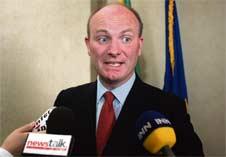Media: Lisbon and the Press

The Lisbon Treaty referendum thoroughly dominated press coverage in both the lead-up to the poll and in its aftermath. The most striking thing about this coverage was that every single newspaper, bar none, adopted its proprietor's opinions as their editorial line. So, for example, Rupert Murdoch is a critic of the EU's ambitions to become an independent strategic player. In April of this year, in a speech to the Atlantic Council of the United States, he argued in favour of NATO expansion and decried the “painful truth” that Europe was “losing its faith in the values and institutions that have kept us free”. Every single one of his newspapers in Ireland (The Times, The Sunday Times, The Sun and The News of the World) dutifully opposed the Lisbon Treaty.
Lord Rothermere, owner of Associated Press, has rarely been known to publish an article about the EU which didn't cast it as a hive of bureaucrats desperate to ban great British traditions. His Irish newspapers, the Irish Daily Mail and the Irish Mail on Sunday, came out strongly against Lisbon too.
On the other side of the coin, the treaty was whole-heartedly supported by almost the entirety of the Irish business and political elite and every single Irish-based newspaper duly took an editorial line in favour of the treaty. Support for the treaty was strongest in the Irish Times, where the results of the last opinion poll before the referendum, showing a No majority, were greeted by an incredulous editorial with the headline “are we out of our minds?” The suggestion that an intention to vote against the treaty was a sign of mental illness probably wasn't a particularly persuasive device. Still, every single Irish newspaper took the same line, although a handful of the more independent minded columnists bucked the trend.
In this battle much of the Irish press was at a disadvantage. The Irish broadsheets depend, to a large extent, on maintaining their readers' illusion that they present a fair, objective and balanced view of the world. So, for example, the Irish Times reported a large number of statements by No campaigners, even when they contained highly implausible claims. They published anti-treaty opinion pieces by Coir's Richard Greene, UK Euro-sceptic Frederick Forsythe and Kathy Sinnott, among others, although this balance dried up as soon as the opinion polls showed that the treaty was in trouble. On the other hand, The Sun and the Daily Mail have few such pretensions and are happy to bash the sinister plans of bureaucrats in Brussels ad infinitum, without any need for facts, never mind balance.
The nature of the referendum campaign also conspired against the Irish elite. European treaties are complicated documents, concerned with the workings of arcane institutions governing distant affairs. Due to the lack of opportunities for personal advancement on offer, the major parties find it particularly difficult to mobilise their constituency organisations, while the nationalists and the left are generally more motivated than ever. Thus, Ireland's political and business leaders have generally relied heavily on their advertising, PR and media resources in order to sell their case for European treaties. All of this was particularly so with Lisbon, but the difference this time was that, in Declan Ganley, they were opposed by somebody who had access to comparable PR resources and in Lord Rothermere and Rupert Murdoch, they were opposed by people who controlled a significant minority of the Irish media.
Although the British tabloids have far less political influence in Ireland than the Irish press, a significant proportion of the voting population are not particularly interested in European politics, never mind the extension of Quality Majority Voting (QMV) or new-shared competencies. They absorb information about the issues in fragments: an article here, a radio interview there. By introducing sufficient alternative interpretations of the significance of the treaty into the public sphere, Libertas and their media allies were able to blunt the power of the Irish elite to frame the debate along the lines that they had chosen.
With the persuasive power of the media thus neutralised, and a large number of conflicting interpretations in circulation, many voters' decisions to vote one way or the other depended on who they trusted the most. When it came down to this, the side that was represented by politicians and IBEC was always going to be in trouble as the electorate's loyalties split along class lines. In the referendum's aftermath, the size of the No vote was interpreted by the Irish media as a symptom of some sort of sickness infecting the Irish psyche. With campaigning over, the political elite once again had free reign to diagnose the cause of this collective malaise, unperturbed by pesky oppositionists. Opinion polls were analysed and dissected in a quest to identify the infection, with most commentators agreeing that ignorance and greed were likely culprits.
On 17 June, the Irish Independent's front page carried a report, based on data ‘leaked' from an EU survey. It claimed that “the huge influx of immigrants into the country was a factor in the ‘No' vote”.
This claim was picked up and exaggerated by John Waters three days later, who wrote that “immigration (ie, xenophobic sentiment) was a significant factor in the No vote”. Later that same day, the EU actually released their preliminary findings, which reported that: “at the bottom of the list, just 1 per cent of all survey responses adjudged the “no” votes that they cast to be a way of avoiding an influx of immigrants.”
